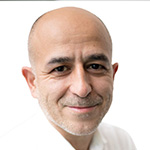Depression: Transcranial Pulse Stimulation also a therapy option here
TPS attracts great interest at Europe’s largest psychiatry congress, DGPPN, in Berlin
Transcranial Pulse Stimulation continues to expand in the field of Alzheimer’s dementia. Thanks to its excellent therapeutic results and the fact that no effective pharmaceutical drugs are expected to be available in the coming years, TPS is establishing itself here as the treatment of choice. But other indications are also on the starting blocks as treatment options: In addition to the already proven efficacy of TPS also in Parkinson’s disease, science is currently intensively studying Long Covid disease (with first highly significant results) and depression.
After studies at the beginning of 2022 had also clinically demonstrated that depression in Alzheimer’s dementia patients can subside amazingly quickly thanks to TPS (see for this: https://www.alzheimer-deutschland.de/aktuelles/tps-forschung/tps-neue-studie-depression), there are now initial research data on the treatment of even therapy-resistant depression.
Depression: one of the most underrated diseases of all
According to the World Health Organization (WHO), approximately 350 million people suffer from depression. Approximately 20% of all people develop depression or a chronic depressive mood called dysthymia at least once during their lifetime. Women and older people suffer more frequently than men and young people. Measured by the international indicator YLD (“Years Lost due to Disability”), which describes the loss of healthy life years due to health limitations, depression is the most important illness of all.
Treatment strategies to date: complicated, lengthy, uncertain, and fraught with adverse effects
Depression, which can manifest in a wide variety of forms and stages, is not synonymous with melancholy, sadness, or low mood. Rather, it brings those affected mentally and emotionally, and often physically, to the brink of the abyss. Often, patients – if they seek medical treatment at all – fall into an emotional low for many weeks or months, or even years in the case of chronic depression, which is so stressful for them, as well as for their relatives and social environment, that entire life plans are destroyed.
In medicine, attempts are made to help patients with various forms of psychotherapy, relaxation therapy or medication, or to combine the various approaches. However, psychiatrists usually prescribe the available medications only with caution and only when there is no other way: Psychopharmaceuticals are unfortunately characterized by their often complex side effects, which sometimes do more harm than good to those affected – see also: https://www.alzheimer-deutschland.de/aktuelles/beitraege/neue-studie-tps-therapie-sicher .
In the field of technical therapy methods, the treatments used to date include deep magnetic stimulation (TMS) and electroconvulsive therapy (E.C.T.) for depression. TMS uses strong electromagnetic fields to stimulate or inhibit the activity of certain areas of the brain.
E.C.T. is used for very severe and otherwise treatment-resistant forms of depression. Under anesthesia and extensive monitoring, the patient is given current pulses that lead to deliberate convulsions, during which increased neurotransmitters and neurohormones are released. These can lead to an improvement in the depressive state.
What both procedures have in common, however, is that they can be costly and very stressful for those affected.
A sigh of relief for these people could be brought about in the near future by Transcranial Pulse Stimulation, which on the one hand penetrates far deeper into the brain than TMS (TMS reaches only a few centimeters deep) and can thus activate the entire brain area, and on top of that is applied purely on an outpatient basis, is non-invasive and almost always without any side effects worth mentioning.
Therapy-resistant depression: Prof. Ulrich Sprick presents TPS at Europe’s largest psychiatric congress
Transcranial Pulse Stimulation was represented for the first time this year with no less than three presentations at Europe’s largest specialist conference, hosted by the “Deutsche Gesellschaft für Psychiatrie und Psychotherapie, Psychosomatik und Nervenheilkunde e. V. (DGPPN)” in Berlin from November 23-26, 2022.
The presentation by Prof. Dr. med. Dr. rer. nat. Dipl.-Psych. Ulrich Sprick, chief physician at the Alexius/Josef Hospital in Neuss, who is also a member of the medical faculty at the Heinrich Heine University in Düsseldorf, attracted particular attention with subsequent large discussions. His areas of expertise include neuroplasticity and brain stimulation.
During his lectures, he also presented his findings on TPS and depression. As a model, he presented the case study of an 81-year-old patient who had been suffering from a major depressive disorder for one and a half years. The patient did not present with dementia. All pharmacological approaches with a wide variety of drugs including S-ketamine (an anesthetic that is also used to treat severe depression) and other measures did not bring any improvement.
Prof. Sprick treated the patient in a curative trial according to the parameters of Alzheimer’s dementia therapy with TPS: The proband was treated with Transcranial Pulse Stimulation three times a week for 30 minutes each within 14 days, so he received a total of six individual treatments.
In addition to clinical assessment of depressive symptoms, various standard tests were administered two weeks before and six weeks after TPS treatment.
The result: significant, exceptional, and sustained improvement in mood
The patient showed a significant and striking improvement in overall mood after the six TPS treatments, which is described as exceptional even for researchers already familiar with TPS in the field of Alzheimer’s dementia. Also in the further clinical tests the subjective perceptions of the scientists, the social environment and the patient himself could be substantiated according to all scientific criteria.
Most encouragingly, half a year later the subject is still doing well. During this time, he received only a single booster treatment of 30 minutes with the TPS and his condition is permanently stable.
Depression and Transcranial Pulse Stimulation – the Outlook
Based on the already proven or postulated mechanisms of action of shock wave therapy on the brain, physicians working with TPS, who also treat depression in individual cases as part of the healing experiment, assume that Transcranial Pulse Stimulation, in addition to its encouraging and proven effectiveness in Alzheimer’s dementia, can also be the treatment of choice for depression – and not only for therapy-resistant depression as in the case study of Prof. Ulrich Sprick, but also for moderate and severe depression in many people.
The advantages of TPS are obvious: In psychiatry, the use of psychotropic drugs could soon be reduced and those affected could find an effective way out of this distressing disease with far less or ultimately no stress at all due to this treatment method. It is to be hoped that TPS will soon gain a foothold in the treatment of depression as well.


